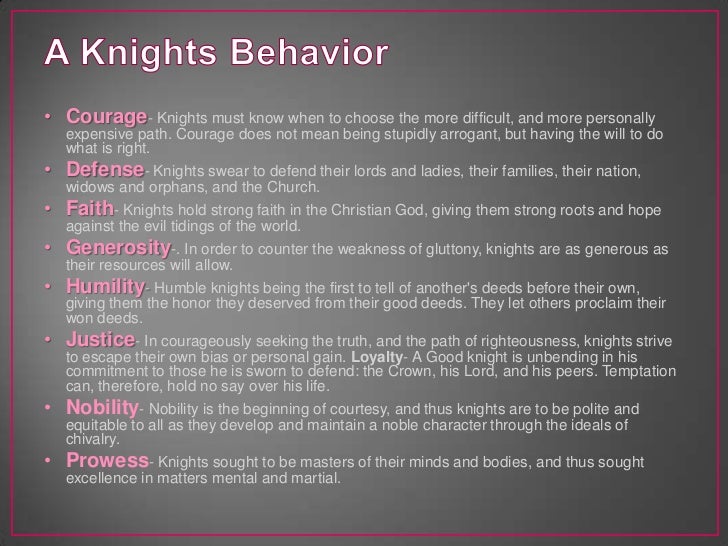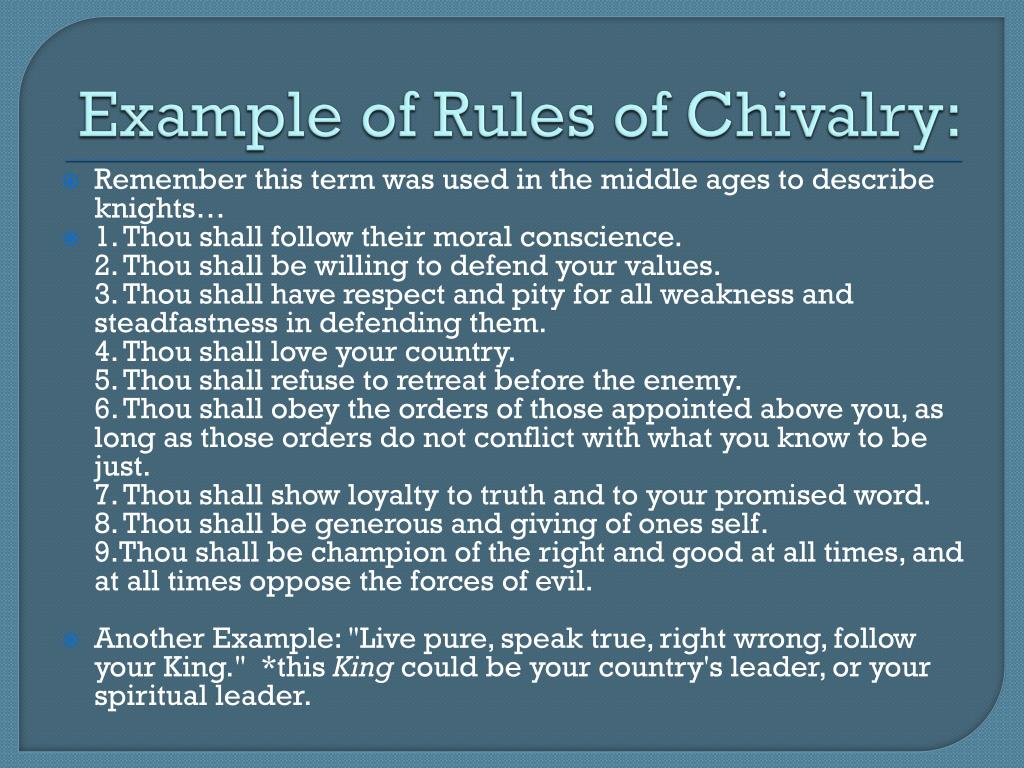

One 1023 oath, suggested by Bishop Warin of Beauvais for King Robert the Pious and his knights, gives us a good sense of some of the unexpected rules warriors might be asked to adopt, in response to their often violent behavior. You can think of these as rules for knighthood.

Basically, the Church imposed religious sanctions in order to halt the nobility from fighting among themselves at certain times and committing violence against local noncombatants. Starting in the late 900s and lasting till the thirteenth century, a movement known as the Peace and Truce of God rose in Europe. There was no uniform "code of chivalry," and those codes that existed were often far more religious in nature than our modern concept of "hold the door for ladies." They also cropped up in part to keep knights and warriors from acting on their worst impulses and attacking or extorting weaker individuals. That meant that sometimes, regional conflicts set a group of armed toughs tearing through the countryside and doing whatever the heck they wanted.Ĭodes of chivalry didn't take hold in vacuum. Generally speaking, however, in many cases, knights and medieval warriors served as a local lord's private military. It's difficult to speak broadly about the medieval era in Europe, given that it encompasses several centuries and an entire continent. The romantic notion of the daring, pure-hearted knight errant lingers on, even today. He argues that medieval chivalry had a major part in molding "noble values," and, as a result, has had an impact felt long after troubadours and jousting tournaments fell out of fashion.

If these paintings about knights have made you curious to see more depictions, you can explore our Pinterest boards dedicated to Knights or Knights Fighting Techniques.In the popular imagination, chivalry seems to harken back to some mythical era when armored knights rode about the land going on quests, saving maidens, and fighting evildoers.īut chivalry is really a word "that came to denote the code and culture of a martial estate which regarded war as its hereditary profession," Maurice Keen writes in " Chivalry." Miniature of Ladies Watching Knights Jousting, c.1410-c.1414. Despite all the dangers, especially for the younger knights, the tournament was an unmissable opportunity, and the chance for the men to obtain what they wanted most: fame and glory, a respected master and a rich woman. In the tournament, the knights proved their skill and courage to an enthusiastic audience. It served not only as entertainment, but as training for armed combat, and often resulted in injuries or even death. Rijksmuseum, Public DomainĪn important part of the chivalrous life was the tournament. Two Fighting Knights, Known as ‘Mort de Monseigneur le Duc de Clarence’ by Alfred Emile O'Hara de Nieuwerkerke, 1838. For those that were deemed eligible, there was a formal ceremony in which a sword was raised by the king, queen or another nobleman in recognition of their new status. Usually, descent from noble, chivalrous ancestors was required. Not everybody was able to become a knight, though. Once his training was complete and he reached the "fighting age", he became a full-fledged knight. First, a knight had to learn to use weapons and, most importantly, the skills of handling a horse in combat. The education of a future knight usually began at an early age. Tents and Mounted Knights by Jean Froissart, c.1470-1472. It was a rough and brutal time and even the knights did not always take their virtues seriously. In day-to-day life, however, ideals and reality were often far apart. We owe knights for this specific code of honour.īravery, loyalty, protection of the weak and the worship of women - all were major moral ideals in the Middle Ages. These values go back to the Middle Ages when the history of chivalry began. Even today, we talk about chivalry when a man is respectful, generous and above all helpful.


 0 kommentar(er)
0 kommentar(er)
